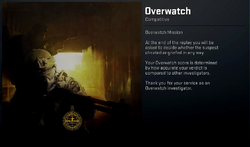Dasiwang: Your Gateway to Trending Insights
Stay updated with the latest news, trends, and insights across various topics.
Beyond the Dust: How CSGO's Overwatch System is Shaping Fair Play
Discover how CSGO's Overwatch system is revolutionizing fair play and leveling the playing field. Uncover the secrets behind the dust!
Understanding CSGO's Overwatch System: A Deep Dive into Fair Play
The Overwatch system in Counter-Strike: Global Offensive (CSGO) serves as a pivotal mechanism for maintaining fair play within the game. Introduced to combat cheating and disruptive behavior, this player-driven review process allows community members to evaluate matches where players exhibit suspicious or damaging actions. Players can be called upon when they report users, and these reviewers are tasked with assessing various reports based on gameplay footage. The importance of community involvement cannot be overstated, as it serves not only to enhance the gaming experience but also to create a sense of responsibility among players in upholding fair play standards.
Once a player is reported, and a sufficient number of other players have agreed to review, the Overwatch system kicks into action. Reviewers are presented with key moments from the flagged match, where they must decide if the player in question has exhibited behavior worthy of sanctions or if they are simply skilled players misinterpreted due to their gameplay. With a focus on fair play, the process emphasizes the need for both objective judgment and a thorough understanding of game mechanics. Successful enforcement of this system leads to a more enjoyable environment for everyone, as it discourages cheating and promotes fair competition.

Counter-Strike is a highly popular tactical first-person shooter game series that focuses on team-based gameplay, strategy, and skill. Players can enhance their gaming experience by opening cases and acquiring skins, such as those available through clash.gg cs2 cases. The competitive nature of the game has led to a thriving esports community, making it a staple in the gaming industry.
How Effective is CSGO's Overwatch System in Reducing Cheating?
The Overwatch System in CS:GO serves as a community-driven approach to combating cheating and fostering a fair playing environment. Launched in 2016, this system allows players to review reports on suspected cheaters, adding a layer of accountability to the game's competitive scene. Players, acting as"Overwatch Investigators," analyze gameplay clips and make determinations about whether cheating occurred. This model not only empowers the community to take part in policing the game but also helps Valve identify prevalent cheating methods, thus allowing for ongoing adaptations to improve overall security.
Despite its strong intentions, the effectiveness of the Overwatch System has been a subject of debate. While it has contributed to a notable decline in cheating reports, critics argue that the response time to effectively ban cheaters remains inconsistent. As an example, one study highlighted that only 30% of suspected players caught in Overwatch received immediate action, which raises questions about the system's overall efficiency. Ultimately, the Overwatch System has proven beneficial in reducing instances of cheating in CS:GO, but ongoing improvements and enhancements are essential to maintain a balanced and fair competitive atmosphere.
What Players Need to Know About Reporting in CSGO's Overwatch System
In CSGO, the Overwatch system plays a crucial role in maintaining a fair and enjoyable gameplay environment. Players who encounter suspicious behavior—such as cheating, griefing, or other forms of misconduct—can report these individuals through Overwatch. Reporting is not only a responsibility but a necessary action for fostering a healthier gaming community. To report a player effectively, you must first ensure that you have evidence of their wrongdoing. This can include instances of aimbotting, wallhacking, or verbal abuse. When making a report, take your time to gather detailed instances rather than making snap judgments, as this contributes to a more accurate assessment of the accused player's actions.
Once a report is submitted, it enters a review queue where selected members of the community, known as Overwatch investigators, evaluate the case. Investigators will watch demo recordings of the reported gameplay and will either validate or dismiss the report based on the evidence presented. Players need to understand that reporting someone does not guarantee immediate action, as thorough investigations help prevent false positives and ensure fairness. It is also important to remember that excessive or unwarranted reports can lead to penalties for the reporter, so it is essential to use this system judiciously and responsibly.